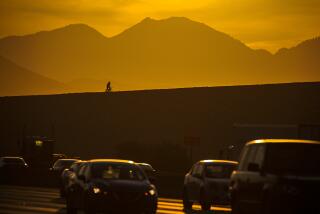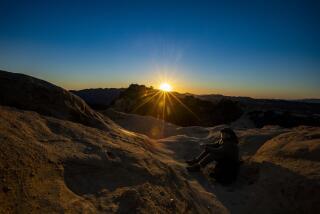Daylight saving time 2014: When do we spring forward?
No, it’s not daylight savings time -- the correct term is daylight saving time -- and it’s coming up this weekend. So pay attention.
At 2 a.m. on Sunday, most of the United States will spring forward an hour and the correct time will be 3 a.m. Spring forward is in the spring, of course, and fall back is when the clocks are readjusted backward by an hour in the autumn.
Fortunately for most people who live in the 21st century, this adjustment will take place automatically on smartphones, computers and tablets that have become the real timekeepers instead of watches and clocks. But those of you still living with non-automated temporal devices on your wrists or shelves will have to manually upgrade the time to stay, well, au courant.
Yes, you will lose an hour of sleep because of the change. If that really matters to you, don’t write your representative in Congress.
The federal government doesn’t require the states to comply with daylight saving time, and indeed some states, such as Arizona (except for residents of the Navajo Indian Reservation), have spurned the practice. Others who will not have to go through the anomaly in the temporal stream include Hawaii, Puerto Rico, the Virgin Islands, American Samoa, Guam and the Northern Marianas Islands.
There are always a handful of efforts pending in various state legislatures to drop out of the daylight saving time regime and other efforts to mandate a permanent added hour of usable daylight. It makes for fun debates, usually replete with erroneous arguments.
Perhaps the biggest misconception about the whole process is that somehow by shifting the clock, people are changing the number of hours of daylight. Wrong. What is changing is how society organizes itself to take advantage of time.
Daylight saving time is essentially a creature of the Industrial Revolution and dates from about the turn of the 20th century. Industrial societies are based on time, work shifts, transportation schedules and so on. Agricultural societies are based on daylight, hence the phrase early to bed, early to rise. As societies became more industrial and urban, officials sought to help organize the hours of daylight.
Springing ahead in the spring and summer months allows more time to enjoy outdoor activities. Artificial lighting need not be used as much so energy can be saved, goes at least part of the argument. Tourism gets a boost as well.
So be sure to set your clocks correctly, unless your devices do it for you.
More to Read
Sign up for Essential California
The most important California stories and recommendations in your inbox every morning.
You may occasionally receive promotional content from the Los Angeles Times.










